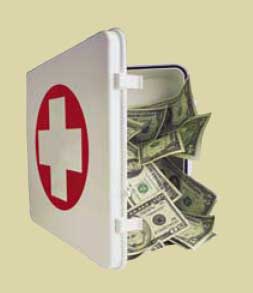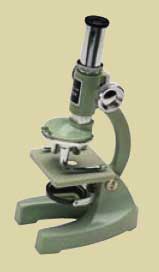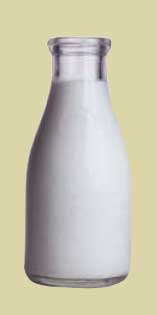Vital Signs:
Focus on Recent Research
This section includes brief accounts of selected Dartmouth research projects on biomedical and health-policy issues.
A hot topic
Overheating may significantly increase the
chance that a newborn will succumb to
sudden infant death syndrome (SIDS).
That early result from the lab of DMS's Dr.
Donald Bartlett was presented at a meeting
of the American Physiological Society. He
found that increasing the temperature of
baby pigs only a few degrees produced prolonged
periods of unstable breathing. He
plans to further test the finding.
More money isn't better
A pair of Dartmouth economists found that
patients in states that spend the most on
Medicare get less effective care.
Katherine Baicker and Amitabh
Chandra looked at how often
patients received 24 treatments
known to be effective-such as
regular eye exams for diabetics-
and discovered that rates
are lower in the states that
spend the most; in high-spending
states, funds are put into intensive, expensive
care, not proven, basic care. "Improving
care has everything to do with how
the money is spent," says Chandra. The
study was published in Health Affairs.

A pediatric "tool kit"
"Introducing change into a busy pediatric
practice is like trying to repair a bicycle
while riding it," asserts Dr. Carl Cooley, an
adjunct member of the DMS faculty. So he
and a colleague, research associate Jeanne
McAllister, developed a "tool kit" to help
pediatricians refocus their practices to better
serve children with complex, multiple
health-care needs. Their concept-based
on close-to-home care-was refined in four
private practices throughout Vermont and
New Hampshire and was described in a
recent issue of the journal Pediatrics.
Touching testimony
Technology doesn't always distance patients
from their health-care providers. Adjunct
faculty member Cornelia Ruland
asked 52 outpatients at Dartmouth's Norris
Cotton Cancer Center to use an electronic
touch pad to record their symptoms
before their appointments. In a control
group, nothing was done with the information;
in the experimental group, the results
were printed out and given to the clinician
before the consultation. After their
visits, patients were asked which concerns
had been addressed. In the control group,
only 20% of symptoms were addressed, but
in the experimental group 55% were. The
findings were published in the Journal of the
American Informatics Association, and Ruland
just received three years of funding to
further test the concept.
What a CAD!
Coronary artery disease (CAD) is the leading
cause of death in the industrialized
world. But the most widely used noninvasive
means of detecting it-an exercise
test-has a high rate of both false positives
and false negatives. A promising new diagnostic
method based on changes in a blood
marker is being tested by Dr. Robert Foote,
a cardiologist at Dartmouth. He compared
levels of a neurohormone called B-natriuretic
peptide (BNP) before and after exercise.
"Over 90% of the patients with inadequate
blood flow showed an abnormal
increase in BNP," says Foote. "Only 37.5%
of the same patients' electrocardiograms
showed abnormal patterns." The work was
published in the journal Circulation.

A fast brake
Pancreatic cancer is an aggressive and cagy
foe: it spreads rapidly and resists traditional
chemotherapy. Dr. Murray Korc, chair of
medicine at DMS, likens the disease to a
car with a stuck accelerator. "Naturally, you
apply the brakes," he says. Yet not only do
the brakes not work, but the cancer has
converted them into an accelerator.
"In essence," Korc
explains, "pumping the
brakes gives you two accelerators."
There is promise,
however, in a recent report from Korc's lab
of a new method of treating the disease. It
focuses on the over-expression of a molecule
called VEGF, which hampers chemotherapeutic
efforts against pancreatic cancer.
The lab's findings were reported in the
journal Clinical Cancer Research.
Blockbuster results
One of the leading causes of stroke is blockage
of the carotid artery-the vessel in the
neck that supplies blood to the brain.
Surgery to remove blockages in high-risk
patients results in serious complications or
death in as many as 14.5% of cases. But a
DHMC study involving 100 such patients
who received a far less invasive procedure-
clearing the artery of plaque by in-
flating a "balloon" in it, and then inserting
a tiny metal tube called a stent-"far surpassed
our expectations," says Dr. Richard
Powell, chief of interventional vascular
surgery. "We had no deaths and no major
strokes in these patients, despite their highrisk
status." The results were published in
the Journal of Vascular Surgery.

Got milk?
DMS cancer researchers have discovered a
new vitamin in a molecular pathway central
to such vital processes as gene
regulation, metabolism, and aging.
And, they found, milk contains this
nutrient. Nicotinamide riboside
had been thought to be a vitamin
form of a common small molecule
that appeared only in certain bacteria.
But the researchers saw it
had properties of a vitamin in
yeast and then identified it in the
whey of milk. Conducted in the lab of
Charles Brenner, the work was published
in a recent issue of the journal Cell.
If you would like to offer any feedback about this article, we would welcome getting your comments at DartMed@Dartmouth.edu.
